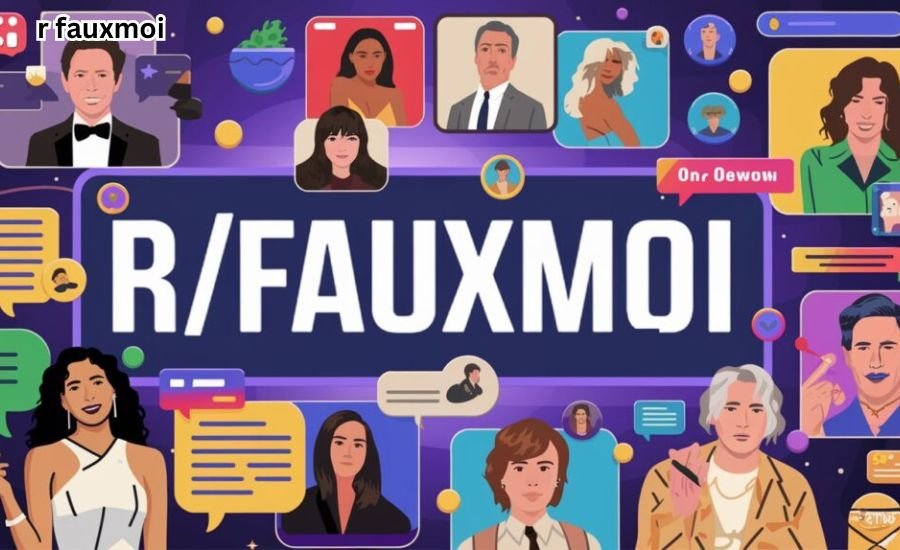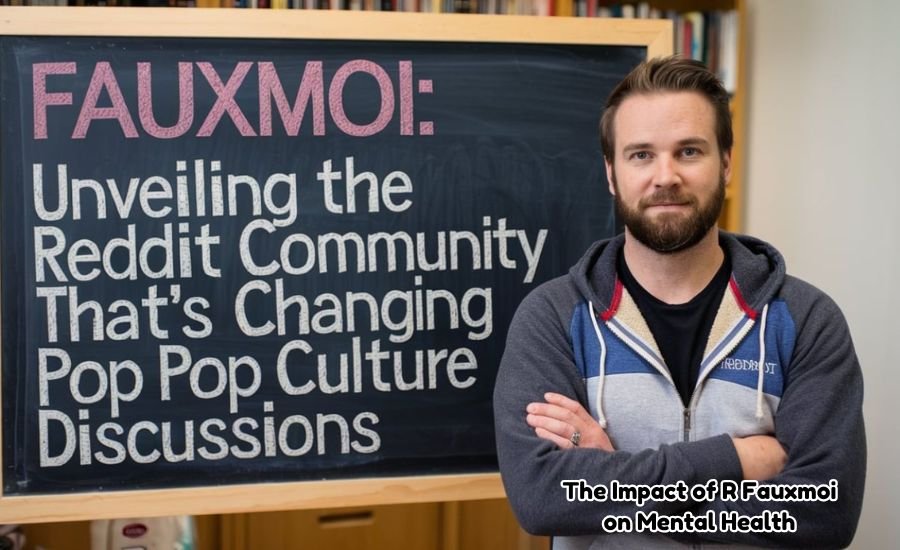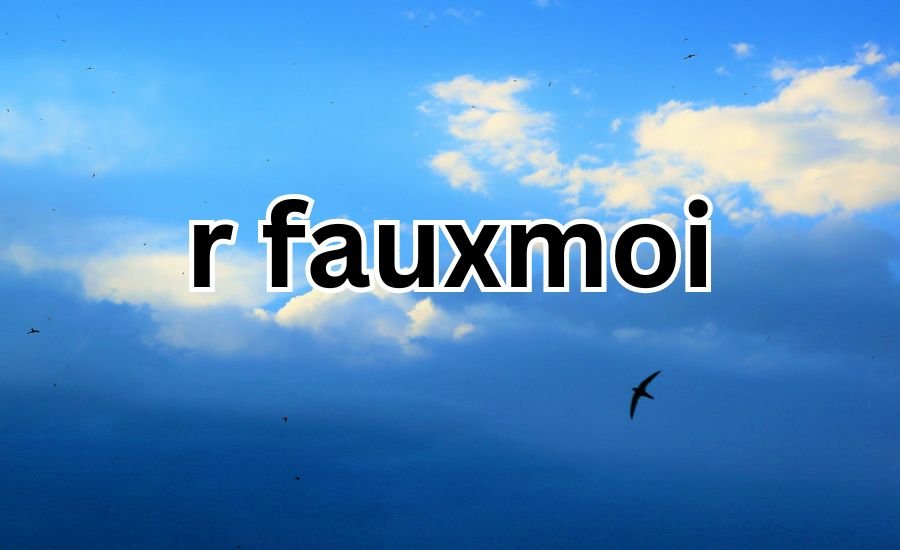The age of digital has altered how people communicate, influencing how people present themselves online. One word that has received much attention in recent years is the term r fauxmoi. It is the concept of creating a planned sometimes exaggerated, or even completely fake online persona. In a society where social media play an important function in self-expression and communication The concept of fauxmoi reveals the difference between real-life identities and online personas.
A lot of people are driven to present an idealized image of themselves regardless of whether it’s for public recognition, self-branding or for a sense of emotional release. The increase in celebrities, influencers and even ordinary users who engage in this kind of behavior has made r-fauxmoi an important topic for discussion. When we know what r fauxmoi signifies and the implications of it to us, we can make informed choices regarding the way we interact with digital spaces.
What Does R Fauxmoi Mean?

The word r fauxmoi combines two different elements: faux, which is a reference to fake or false in French and moi, which translates to me. Together, they refer to the concept of a false me–a self-representation of oneself that isn’t authentic, but altered to meet the expectations of society. This type of behavior is commonly seen on social media platforms, which allows users to carefully select and select the most appealing aspects of their lives in order to create a false impression of perfection.
People are involved in r flimoi to satisfy a variety of motives. Many want to appear attractive, successful or attractive and others make use of it to avoid personal issues. The range of possibilities can be as small as exaggerations, like applying filters or editing images or videos, to extreme instances where people create completely fake identities. This practice is deeply ingrained in the modern world of digital culture, impacting everything from relationships and friendships to job opportunities and psychological well-being.
How R Fauxmoi Affects Self-Image
The effect of r fauxmoi on self-image is enormous impacting how people view their own image and that of others. The widespread use of filters, photo editing tools and AI-generated improvements, social media has turned into the perfect breeding ground for unattainable beauty standards and lifestyles. People often compare their own lives with the perfect and polished images they see on the internet and often lead to self-doubt as well as insecurity.
A major repercussion of r flimo is the pressure to adhere to the norms. Many people find themselves compelled to alter their appearance, performance or even their personality to be accepted by their followers on social media. This leads to a situation where self-esteem is based on likes or comments as well as followers counts.Another issue is self-perception that is inaccurate. If people constantly present an idealized version of themselves and struggle to accept their true identity. In time, they may become accustomed to their idealized self, making it difficult to accept flaws.
The Rise of Influencer Culture and R Fauxmoi
Influencer culture plays an important aspect in the spread of r fauxmoi. As many content creators depend on well-crafted personas to keep their followers. Celebrities, influencers, and social media stars often offer the world in a curated way that showcase luxurious lifestyles, perfect relationships and an apparent effortless success.
Although this type of content may be uplifting but it also raises doubts regarding false advertisements and expectations that are unrealistic. Influencers who employ filters, editing professionals or even manipulate their content in order to create a false impression that their lives are more glamorous than they are. This creates a false impression that ordinary people try to attain, often not realizing that a lot of the content they view isn’t completely authentic.
Effects of R Fauxmoi on Social Media Platforms
| Platform | Effect of R Fauxmoi | Audience Impact |
| Filters, curated posts and the lifestyles of influencers increase fauxmoi | Makes beauty standards unrealistic | |
| TikTok | Short films often portray the idealized lives of people, thereby increasing fauxmoi | The site pressures users to create fake content |
| YouTube | Vlogs that are edited and staged pranks are a major contributor to the faux-moon | Misleading narratives affect viewers |
| A selective exchange of views or news events contributes to the fauxmoi | Skews perceptions of reality by the public |
This table demonstrates how various platforms can contribute to the rise of r fauxmoi and the way the public is in the process of being affected.
Things You Have To Know: Talkbass-ultimate-guide-for-bass-players
Why People Embrace R Fauxmoi
There are a variety of reasons individuals commit r fauxmoi that are all linked to social and psychological motives. One of the main reasons is social validation, the desire to be loved and appreciated by other people. When individuals receive positive feedback about their content, it strengthens their desire to keep presenting the idealized version of themselves.Another motive is the potential for financial and career advancement.
A lot of users, especially those who are influencers or content creators use r fauxmoi to build a following and secure deals with brands. Through maintaining a professional image it can improve their visibility and increase their online reach.Lastly many people utilize the r fauxmoi method as a way of escape. Life can be stressful and establishing a perfect digital identity can allow people to temporarily escape the real issues. However, it could cause more emotional stress in the event that they are unable to keep the illusion going over the long term.
The Impact of R Fauxmoi on Mental Health

Although r fauxmoi might appear innocent at first glance but it could have severe effects on your mental health. The constant management of an exaggerated online profile requires significant emotional exertion, resulting in anxiety and stress. Many users fear being exposed, and worry that their actual lives might not reflect the image they have created online.
Furthermore, people who consume content with a high degree of curated quality tend to have self-esteem issues, believing that they aren’t as attractive, successful or content as other people. Thecomparison trap can be a major cause of depression as people find themselves feeling like they’re falling behind in life.To remain in a positive connection to social networks, it’s essential to take part in a digital detox by following authentic creators and prioritize authentic experiences over the online confirmation.
Conclusion
The concept of r fauxmoi exposes the complicated relationship between digital personas as well as the real-world identity. While creating a self-image idealized online may provide temporary benefits however, it raises doubts regarding the authenticity of identity, health as well as social pressure. The desire for validation in career prospects, as well as the desire to escape from reality are among the main reasons behind this trend. However, the long-term ramifications of faux pas can be harmful and can lead to self-doubt, anxiety and even emotional exhaustion.
In order to create a healthier online environment, it’s essential for people to examine their online behaviour and to make an effort to remain true to their values. The social media platform should serve as a place that allows for genuine connections and meaningful interactions not merely a place for comparing yourself to others. Integrity is the key to building better relationships, greater confidence in oneself, and a stronger feeling of self-acceptance.
Read You Have To Know: Mamgabuddy
FAQs
What is fauxmoi?
The term r fauxmoi refers to the creation of digital identities that are distinct from the real-life persona typically seen through social networking platforms.
Why do people get involved in fauxmoi?
Many use it to show social approval as well as personal branding, escapism or to keep their personal information private when they interact online.
Is r fauxmoi harmful?
It could be particularly if it causes self-doubt or doubts about oneself or emotional stress from creating a false impression.
How does r fauxmoi affect mental health?
It could create anxieties, low self-esteem and stress to maintain an impeccable digital identity.
Can r fauxmoi be utilized constructively?
Yes, it can aid in the process of creative expression as well as career development and protecting your online privacy provided it is done so ethically.
What can I do to tell whether someone is committing fauxmoi?
Check for inconsistent behavior in their online and offline behaviour or content that is too polished, or over-inflated achievements.
How can I stay away from getting caught in the trap of fauxmoi?
Be authentic, avoid the use of social media in comparisons, and place a high value on your mental health above online approval.
Do influencers use r fauxmoi?
Many influencers have fictionalized version of their life. Sometimes, they’re blurring the lines between the real and fictional.
Can social media platforms reduce r fauxmoi?
Yes, through encouraging transparency, reducing filters and encouraging more authentic content.
How do I maintain my real and online identities?
Be mindful of what you share, make breaks from social media, and participate in activities offline that create true joy.
